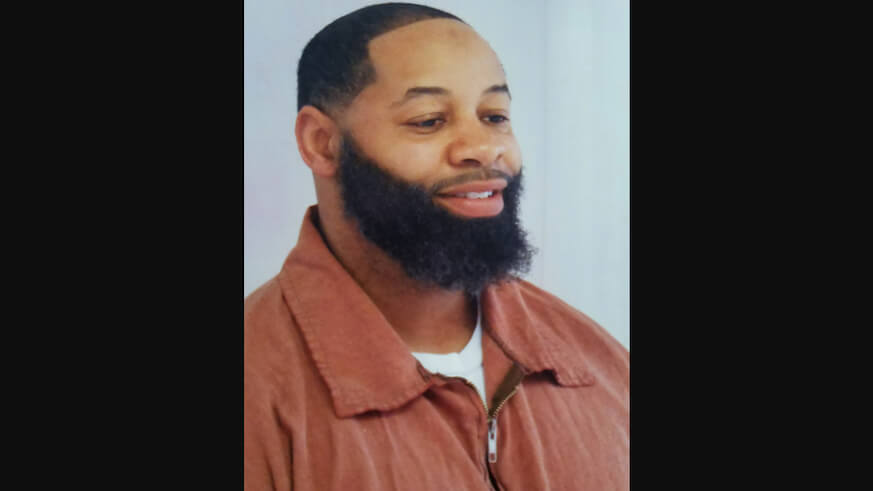Philadelphia man Michael Holmes, 46, has been in prison for nearly 26 years for charged related to the 1989 murder of Jerome Harris during a drug-related, botched robbery, which occurred when he was 17. Although he wasn’t charged with pulling the trigger, he was sentenced to die in prison under the felony murder statute as an accomplice. But after recently being re-sentenced to 26 years to life, he was granted parole at a hearing in February, and now is scheduled for release in May.
“We are just so happy and excited and thankful this day has finally come,” said Sabrina Stokes, Holmes’ fiancée, who has visited him every week for more than two decades. “I’ve been in his corner since day one. He’s always kept his spirits up. It took years, but I’m just glad to see him coming home.”
Holmes is one of the “juvenile lifers,” defendants sentenced to life in prison for crimes committed while they were under 18, all of whose cases are being retroactively reconsidered. Some 517 such defendants existed in Pennsylvania – the highest number of any state – 300 of them from Philadelphia. Some 180 Philadelphia cases remain pending.
The Supreme Court ruled life sentences for juveniles were unconstitutional in its 2012 “Miller” decision, and in the 2016 “Montgomery” decision made the ban retroactive and ordered all such sentences to be reconsidered. That led to a wave of cases being reopened, and the Defenders Association of Philadelphia asked Mark Sheppard and Arianna Goodman, white-collar criminal defense lawyers at Montgomery McCracken Walker & Rhoads LLP, to assist with some cases, including that of Holmes.
“He was really someone who deserved a second chance,” said Sheppard, who reached a re-sentencing agreement with prosecutors under former Philly DA Kelley Hodge that made Holmes immediately eligible for parole. “Miller and Montgomery recognized that young people’s decision-making process is flawed, it’s not based on a brain that is completely developed.”
In Sheppard and Goodman’s court papers, they note that Holmes says he was pushed by peers toward the drug trade at age 14 and resisted, but took responsibility for later getting involved around the age of 16 and participating in illegal activity. Since being incarcerated, he has obtained his GED, took multiple classes, and has housing and employment options available after release through his friends and family, including possibly resuming work as a barber.
“That was extremely heartwarming, to see how much support he has after being incarcerated for 26 years,” Goodman said. “He had a lot of support throughout the entire process. In that regard, Michael was very lucky.”
The family of victim Jerome Harris could not be reached for comment, although Holmes apologized to them at his resentencing hearing.
“I was hoping that I would be able to say I’m sorry to the victim’s family. I wish that they was here today so hopefully they could accept my apology,” Holmes said, according to a court transcript. “As a teenager I committed in many people’s eyes and unforgettable act. … I want everyone to know that I’m no longer a disappointment to the community, myself, or my family members, and if I am given a second chance that I would be productive and encourage people to do the right thing.”
Holmes’ life sentence was also striking because it was tied to a second-degree murder conviction, under the felony murder statute, which serves to convict defendants involved in a felony that resulted in a murder, even if they did not cause it, and carries a mandatory sentence of life without parole. Holmes was first arrested on charges related to Harris’ 1989 murder in 1990. Charges were dropped in 1991 after a witness failed to testify, but he was re-arrested in 1993. His co-defendant at the time who charged with pulling the trigger was acquitted of all charges, but Holmes got a life sentence for allegedly participating in the robbery that ended murder.
“The evidence at trial was equivocal and ambiguous as to who the shooter was, as is often the case when you’re trying three or four people for something and they start pointing fingers at each other,” Sheppard said.
Stokes insisted that Holmes had no involvement with Harris’ death. “He wasn’t there,” she said. “But he accepts it, because of the lifestyle he was living at that time.”
State Senator Daylin Leach has introduced legislation to eliminate the felony murder statute in Pennsylvania, a potential reform that Sheppard noted is “something whose time may have come.” But working on Holmes’ re-sentencing, which he called a “very worthwhile and rewarding experience,” raised questions about life sentences without parole.
“It will be important to see how these folks fare once they’re paroled. I think the idea of life without parole is one of the reasons we have one of the highest incarceration levels of any state in the country,” Sheppard said. “Whether or not that is truly a way that we want to be spending our limited resources, maybe it’s time for us to reexamine that. … The question of whether we should be paroling lifers is a good one, and hopefully this will be a microcosm and incubator for that.”



























